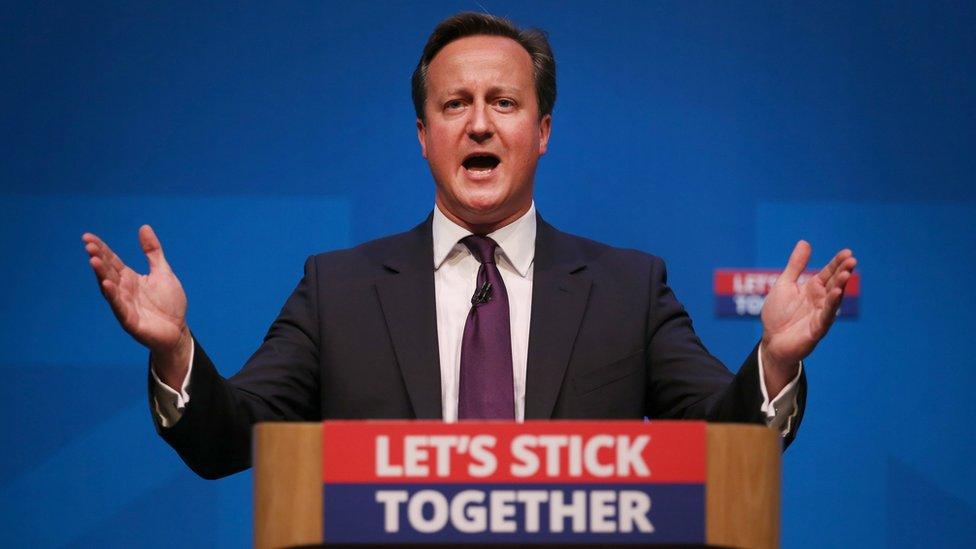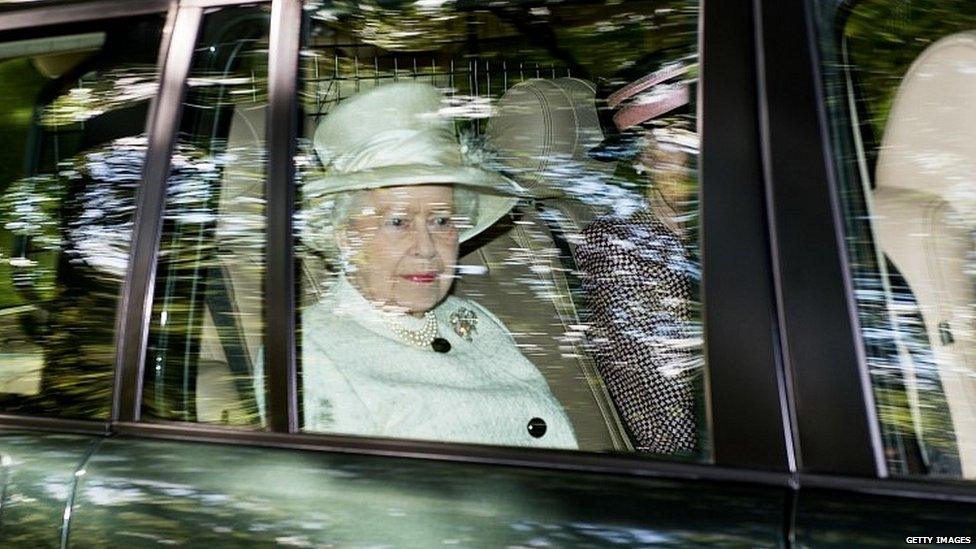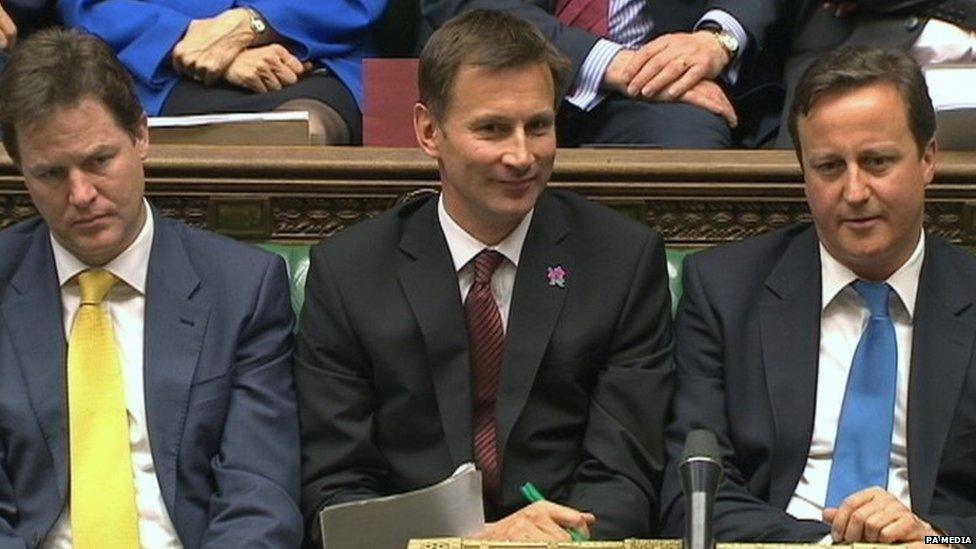Cameron sought Queen's help over Scottish independence
- Published
Former PM David Cameron explains how he sought the Queen's help in Scottish independence vote
Former PM David Cameron has revealed he asked whether the Queen could "raise an eyebrow" about the prospect of Scotland voting for independence.
He told the BBC he sought help from royal officials days before the 2014 vote amid "mounting panic" he may lose.
What was discussed was not "anything that would be in any way improper... but just a raising of the eyebrow even... a quarter of an inch", he said.
The Queen later urged people to "think very carefully about the future".
The comments - made to a well-wisher outside a church on the Balmoral estate - were one of the main talking points of the referendum campaign.
Reflecting on his rise to power and six years in Downing Street in a two-part BBC documentary, Mr Cameron said the Queen's words on the issue were "very limited but helped to put a slightly different perception on things".
Scotland went on to reject independence by a margin of 55.3% to 44.7%, a result which Mr Cameron said left him "blissfully happy".
In a statement, Alex Salmond, who resigned as Scotland's first minister in the wake of the result, said Mr Cameron's actions were not only improper, but showed how desperate the No side was during the final stages of the independence campaign.
Former PM David Cameron criticises Boris Johnson's motives for supporting Leave campaign
The Cameron Years, which begins on Thursday, examines Mr Cameron's modernisation of the party, his decision to enter a coalition with the Liberal Democrats after the 2010 election and the fallout from 2016 Brexit referendum, which led to his resignation.
In it, he says:
He "broods" every day about the Brexit referendum and its consequences
He ignored George Osborne's advice against the poll and Michael Gove's reservations
Boris Johnson "agonised" over his position and "did not really want to leave" the EU
He still believes Brexit can "be delivered and made to work"
His government's austerity programme was "painful" but necessary
Legalising gay marriage was perhaps his "proudest" achievement in office
On the EU referendum, Mr Cameron told BBC Radio 4's Today programme that he "wasn't the slightest bit complacent" during the campaign, saying that he fought "with every fibre of my being".
But he said the Labour leadership during the campaign "simply wasn't there, wasn't committed" and it was "very hard to fight these things on your own".
He added that the result would "probably have been even worse" if people knew he would quit if Leave won the vote.


Just as the first rule of Fight Club is that you do not talk about Fight Club, the first rule of the relationship between the prime minister and the Queen is that you never, ever talk about the relationship between the PM and the Queen.
It is difficult to imagine anything other than horror in the Palace at David Cameron's revelations. Not just because he has broken the first rule. But because he has made it painfully clear that in 2014 he used the Queen for his own political purposes. And that she and her advisors thought that was OK.
The revelation comes as her suspension of Parliament - a suspension made on the effective instruction of Boris Johnson - comes under unprecedented scrutiny in the Supreme Court.
The two cases are very different; but they both highlight the dark greys of the Queen's constitutional position, the discretion she has or lacks, under extraordinary circumstances, to speak out and act.

In the run-up to the 18 September poll on Scottish independence, it was reported that the Queen was concerned about the possibility of Scotland opting to sever the 300-year union with England and Wales.
A Sunday Times poll on 7 September putting the Yes campaign ahead contributed to a "mounting sense of panic" in Downing Street, Mr Cameron recalls.
The poll, which was published while he and his wife, Samantha, were staying at Balmoral, "hit me like a blow to the solar plexus".

A poll finding the Yes campaign in front contributed to a "mounting sense of panic" in Downing Street
Mr Cameron - who agreed to hold the independence referendum in the face of opposition within his party - said there followed urgent conversations between advisers in Downing Street and Buckingham Palace to figure out how the Queen could comment while still remaining within the constitutional boundaries of neutrality.
"I remember conversations I had with my private secretary and he had with the Queen's private secretary and I had with the Queen's private secretary, not asking for anything that would be in any way improper or unconstitutional but just a raising of the eyebrow even, you know, a quarter of an inch. We thought would make a difference."

Buckingham Palace insisted that the Queen was above politics
When asked on BBC Radio 4's Today programme for more detail about what had happened, Mr Cameron said he "didn't want to say anything more about this".
"I'm sure that some people would think, possibly even me, that I've already said perhaps a little bit too much," he said.
At the time, the BBC's royal correspondent said the Queen's words were "more of an observation than an intervention", while Buckingham Palace said any suggestion the Queen was seeking to influence the outcome of the referendum was "categorically wrong".
Officials insisted the monarch was above politics, and the issue of Scotland's future was a matter for the people.
Two weeks after the Scottish referendum, Mr Cameron was forced to apologise after suggesting the Queen "purred down the phone" when she was told about the No result.
'Unfinished business'
While he feels "sorry" about events since the 2016 Brexit vote, Mr Cameron said he did not regret the decision to hold the EU referendum.
While some people would "never forgive" him, he maintained the UK's 40-year membership was becoming "unstable" and the duty of leaders was to "see difficulties coming and try to resolve them and shape the country's response to them".
He accepted he "totally underestimated the latent Leave gene" in his party and that during the campaign while "he had a winning hand, he could not seem to play it".
After losing the vote, Mr Cameron said he knew he had to quit because he did not have the "credibility to deliver Brexit", but was "desperately sad" his time in office was cut short.

Mr Cameron said the coalition government staved off a financial crisis
"I think of all the things we could and should have done if we had been able... to win the referendum," he recalls. "A whole lot of what we could have done effectively ran into the sand of the European issue."
On his economic and social record, he rejects as "total nonsense" opponents' claims that he embraced deep spending cuts as a political choice to reduce the size of the state.
He says the multi-billion pound budget deficit inherited by his government in 2010 was a "clear and present danger to the British economy" requiring immediate action.
"In the end there were difficult and painful decisions, but inequality fell and the share of income tax paid by the richest went up, not down," he argued. "We protected pensioners, we protected the NHS, we protected help for the poorest."
Mr Cameron's long-awaited memoirs, entitled For The Record, was published on Thursday.
In excerpts published by the Times last week, he accused Boris Johnson and Michael Gove of behaving "appallingly" during the Brexit referendum.
The first episode of The Cameron Years will be broadcast on BBC One at 21.00 BST.